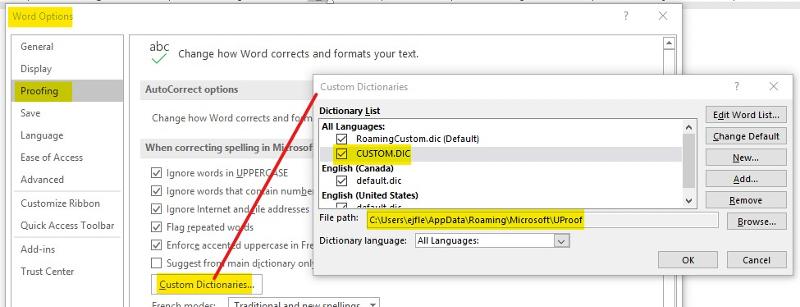Microsoft Word 2013 - I Accidentally Added a Misspelled Word into the Spell-check dictionary.
UGGGGHHHH! I accidentally added an incorrectly-spelled word to my MS word dictionary.
How can I delete the word?
Is it in a file I can edit and browse? I have a feeling I've made this mistake more than once.
How can I delete the word?
Is it in a file I can edit and browse? I have a feeling I've made this mistake more than once.
ASKER CERTIFIED SOLUTION
membership
This solution is only available to members.
To access this solution, you must be a member of Experts Exchange.
Other answers identify how you can fix mistakes in a Word spelling dictionary, and are useful to reverse occasional inadvertent clicks on “Add to dictionary” option.
However, as an alternative to editing a dictionary from the Word dialog (Options > Proofing > Custom Dictionaries...) you can use a text editor to do the editing directly. This can be convenient if your dictionary has many terms, or if you want to merge content from a different source.
First, find where the dictionaries are saved on your computer: use the dialog above to bring up the Dictionary list, and select the dictionary you want to edit. It's file path will be displayed, so you can go to that folder to open the dictionary.
You may find that the default dictionary for recent versions of Word is named RoamingCustom.dic, but when you click on it, no file path is shown! You can use a file finder tool to search for the file name, but to save some time, start looking from the %APPDATA%\Microsoft\Office
When you edit the dictionary in a text editor, note that each entry is on a separate line. You can make changes and delete words, and even merge in words from another dictionary (useful for ensuring consistency with a corporate style standard for example). Although it isn't clear if it matters, I recommend sorting the dictionary alphabetically before you re-save it. The newly-saved dictionary will take effect when you next start Word.
Note that the path for the CUSTOM.DIC dictionary (shown in the screen shot above) may include other dictionary-related files with ".lex" extensions. For example, the "ExcludeDictionaryEN1009.l
Why might it be useful to have an exclusion dictionary? Consider a situation where a Canadian company doing a lot of work in the USA has style guidelines specifying that "centre" should be spelled as "center". If "center" was just added to the custom dictionary, then both spellings would be accepted. On the other hand, if "center" was instead added to the ExcludeDictionaryEN1009.le
For more detail about exclusion dictionaries, see refer to this Microsoft support page.
However, as an alternative to editing a dictionary from the Word dialog (Options > Proofing > Custom Dictionaries...) you can use a text editor to do the editing directly. This can be convenient if your dictionary has many terms, or if you want to merge content from a different source.
First, find where the dictionaries are saved on your computer: use the dialog above to bring up the Dictionary list, and select the dictionary you want to edit. It's file path will be displayed, so you can go to that folder to open the dictionary.

You may find that the default dictionary for recent versions of Word is named RoamingCustom.dic, but when you click on it, no file path is shown! You can use a file finder tool to search for the file name, but to save some time, start looking from the %APPDATA%\Microsoft\Office
When you edit the dictionary in a text editor, note that each entry is on a separate line. You can make changes and delete words, and even merge in words from another dictionary (useful for ensuring consistency with a corporate style standard for example). Although it isn't clear if it matters, I recommend sorting the dictionary alphabetically before you re-save it. The newly-saved dictionary will take effect when you next start Word.
Note that the path for the CUSTOM.DIC dictionary (shown in the screen shot above) may include other dictionary-related files with ".lex" extensions. For example, the "ExcludeDictionaryEN1009.l
Why might it be useful to have an exclusion dictionary? Consider a situation where a Canadian company doing a lot of work in the USA has style guidelines specifying that "centre" should be spelled as "center". If "center" was just added to the custom dictionary, then both spellings would be accepted. On the other hand, if "center" was instead added to the ExcludeDictionaryEN1009.le
For more detail about exclusion dictionaries, see refer to this Microsoft support page.
ASKER
Thanks for all the amazing help!
For more detail about exclusion dictionaries, see refer to this Microsoft support page.In that same vein, you may find this five-minute EE video Micro Tutorial to be helpful:
How to tell Microsoft Office that a word is NOT spelled correctly
Regards, Joe
Select RoamingCustom.dic and then Edit Word List...
Find and select the word you want to delete and click Delete.